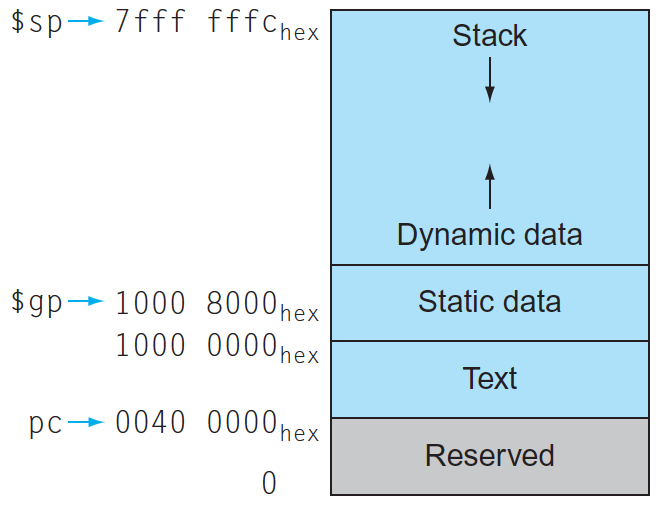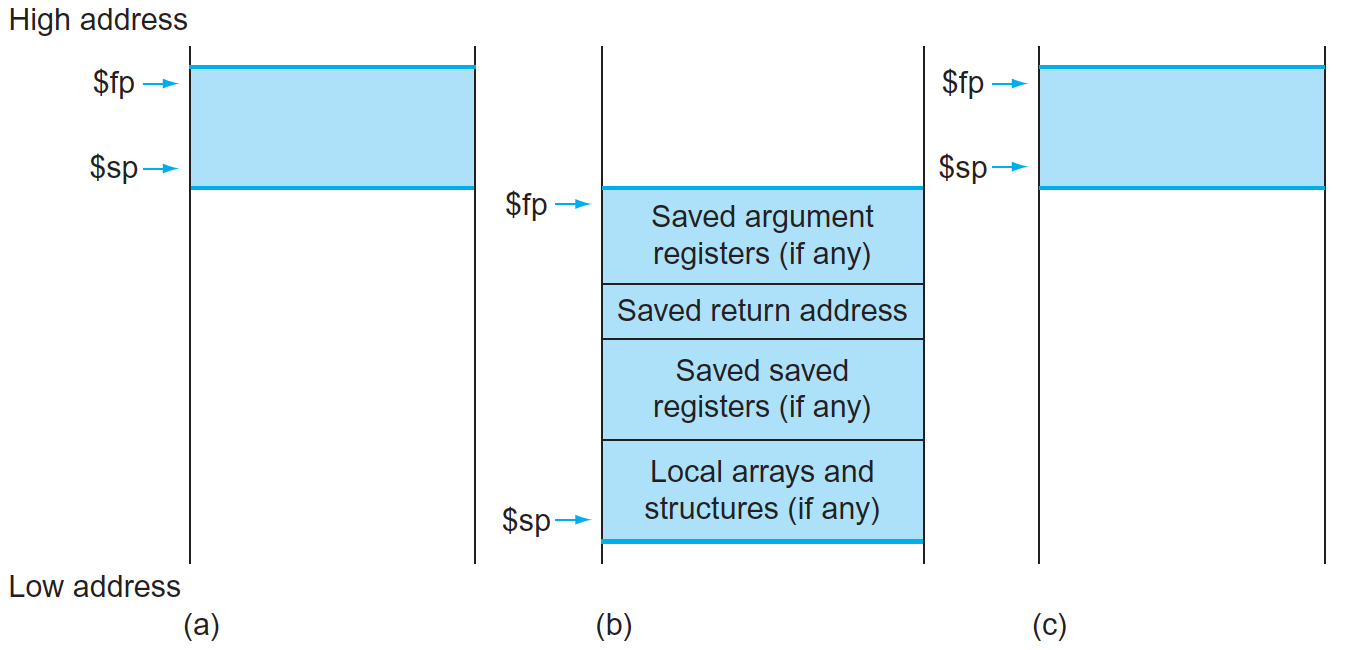# Strings, Arrays, and Pointers --- CS 130 // 2024-11-19 <!--=====================================================================--> # Review <!-- .slide: data-background="#004477" --> <!--=====================================================================--> #### average of four numbers ```c #include <stdio.h> int main() { int a, b, c, d; printf("Enter an integer: "); scanf("%d",&a); printf("Enter an integer: "); scanf("%d",&b); printf("Enter an integer: "); scanf("%d",&c); printf("Enter an integer: "); scanf("%d",&d); printf("The average is %f\n",(a+b+c+d)/4.0); return 0; } ``` <!--=====================================================================--> #### Address of operator **NB:** The `&` operator means "address of" - read from keyboard and store in a specific address in memory ```c int a; scanf("%d",&a); ``` What do `"%d"` and `"%f"` mean? <!--=====================================================================--> #### reverse array function ```c #include <stdio.h> void reverse(int arr[], int n) { int rev = n-1; int start = 0; while(start < rev) { int temp = arr[start]; arr[start] = arr[rev]; arr[rev] = temp; start++; rev--; } } int main() { int arr[5] = {1, 2, 3, 4, 5}; reverse(arr, 5); for (int i = 0; i < 5; i++) { printf("The next value is: %d\n", arr[i]); } return 0; } ``` <!--=====================================================================--> ## `printf` and `scanf` https://www.cplusplus.com/reference/cstdio/printf/ https://www.cplusplus.com/reference/cstdio/scanf/ <!--=====================================================================--> # Strings <!-- .slide: data-background="#004477" --> <!--=====================================================================--> ## Strings - There is no **String** type in C - <!-- .element: class="fragment"--> Strings are just arrays of type `char` ```c char str[20] = "abc"; printf("The string is %s", str); ``` - <!-- .element: class="fragment"--> The above code is shorthand for the following: ```c char str[20]; str[0] = 'a'; str[1] = 'b'; str[2] = 'c'; str[3] = '\0'; // String terminating character ``` - <!-- .element: class="fragment"--> The remaining 16 characters are unused <!----------------------------------> ## Strings - Suppose we forget to include the `'\0'` character ```c char str[20]; str[0] = 'a'; str[1] = 'b'; str[2] = 'c'; printf("The string is %s", str); ``` - What do you think happens? - <!-- .element: class="fragment"--> `printf` continues printing characters until it finds some random `'\0'` character in memory <!----------------------------------> ## Strings - Very simple string operations now become complicated... - <!-- .element: class="fragment"--> Suppose I want to concatenate two strings: ```c char s1[20] = "hello"; char s2[20] = "world"; char s3[20] = ??? // how do I concatenate s1 and s2? ``` - <!-- .element: class="fragment"--> Manually copy all the characters into `s3`... <!----------------------------------> ## Strings ```c char s1[20] = "hello"; char s2[20] = "world"; char s3[20]; int j = 0; // keeps track of the next spot in s3 for (int i = 0; s1[i] != '\0'; i++) { s3[j] = s1[i]; j++; } for (int i = 0; s2[i] != '\0'; i++) { s3[j] = s2[i]; j++; } s3[j] = '\0'; ``` <!----------------------------------> ## Strings - Luckily, there is a `string.h` library with a few helpful functions that does some of this for us, but they just do the same thing as above ```c #include <string.h> char s1[20] = "hello"; char s2[20] = "world"; strcat(s1, s2); printf("The new string is: %s", s1); ``` <!----------------------------------> ## Strings - Here is a common issue: ```c char s[3] = "abc"; int x = 10; printf("The values are %s and %d", s, x); ``` - <!-- .element: class="fragment"--> We did not allocate enough space in `s` to store the string termination character `'\0'` ```c char s[4] = "abc"; int x = 10; printf("The values are %s and %d", s, x); ``` <!--=====================================================================--> # Pointers <!-- .slide: data-background="#004477" --> <!--=====================================================================--> ## Address-of Operator Try this out and discuss what you think is going on ```c #include <stdio.h> int main() { int var = 0; int arr[3] = {1,2,3}; printf("Address of var: %p\n", &var); printf("Address of arr[0]: %p\n", &arr[0]); printf("Address of arr[1]: %p\n", &arr[1]); printf("Address of arr[2]: %p\n", &arr[2]); } ``` <!--=====================================================================--> ## Arrays are addresses ```c #include <stdio.h> int main() { int var = 0; int arr[3] = {1,2,3}; printf("Address of var: %p\n", &var); printf("Address of arr[0]: %p\n", arr); printf("Address of arr[1]: %p\n", arr+1); //does this add 1 or 4? printf("Address of arr[2]: %p\n", arr+2); } ``` <!--=====================================================================--> ## Address vs. Pointer * A **pointer** is a variable that contains an address of some other thing in memory * Arrays *are* pointers in C <!--=====================================================================--> ## Pointers - One of the most powerful features of C is declaring "pointers" to values - <!-- .element: class="fragment"--> A **pointer** is a variable whose value is the address of a memory location - <!-- .element: class="fragment"--> To declare a variable as a pointer, you use a `*` before the variable name: ```c int *p; // p contains an address to an int ``` <!----------------------------------> ## Pointers - To get the memory address of a variable, we use `&`, the address operator ```c int x = 5; printf("Address of x is: %p\n", &x); int *p = &x; // p is pointing to x's memory location ``` - <!-- .element: class="fragment"--> To access the value a pointer is "pointing to", you can **dereference** it using the `*` operator ```c int y = *p; // gets the int p is pointing to printf("p was pointing to %d\n", y); ``` <!--=====================================================================--> ## Arrays are Pointers - In C, arrays are just **pointers** ```c int arr[10]; // arr is a pointer to the address of the // first element of the array ``` - <!-- .element: class="fragment"--> You can use array notation on pointers and pointer notation on arrays ```c int *p = arr; // p points to what arr is pointing to p[0] = 100; // changes arr[0] to be 100 int x = *arr; // gets 100 back ``` <!--=====================================================================--> ## Exercise 1 - Suppose we want to write a function that computes the average of a bunch of `double` values - <!-- .element: class="fragment"--> What would the prototype of this function be? ```c double average(double arr[], int n) ``` <!-- .element: class="fragment"--> - <!-- .element: class="fragment"--> Finish writing the function <!--=====================================================================--> ## Exercise 2 - Write a program that asks the user to enter in 10 doubles, computes the average, and prints it off - Use an array and a loop to get input from the user - Use the `average` function to compute the average <!--=====================================================================--> ## Exercise 3 - How can we modify this program so that the user can enter **any** number of inputs? <!--=====================================================================--> # C and The Computer's Memory <!-- .slide: data-background="#004477" --> <!--=====================================================================--> ## A Problem - Suppose I want to create a function called `duplicate` that takes an array of integers as input, creates an identical copy of it, and returns it - What are some issues we have to think about when implementing this? <!----------------------------------> ## A First Attempt ```c int * duplicate(int *arr, int n) { int new_arr[n]; for (int i = 0; i < n; i++) { new_arr[i] = arr[i]; } return new_arr; } ``` - <!-- .element: class="fragment"--> This is incorrect! - <!-- .element: class="fragment"--> The array `new_arr` is **locally scoped** and its memory is freed once the function returns! <!----------------------------------> ## Try it yourself and see what happens ```c #include <stdio.h> int * duplicate(int *arr, int n) { int new_arr[n]; for (int i = 0; i < n; i++) { new_arr[i] = arr[i]; } return new_arr; } int main() { int myarr[5] = {1,2,3,4,5}; int *myarr_copy = duplicate(myarr,5); for(int i=0; i< 5; i++) { printf("%d\n",myarr_copy[i]); } return 0; } ``` <!--=====================================================================--> # Stack / Heap Memory <!-- .slide: data-background="#004477" --> <!--=====================================================================--> ## Review: Memory Structure  <!--====================================================================--> ## Review: Stack Frames  <!--====================================================================--> ## Stack Memory - **Stack memory** is the space where local variables, function calls, etc., are allocated - <!-- .element: class="fragment"--> Locally scoped variables are freed when the code block they were defined in finishes <!----------------------------------> ## A First Attempt ```c int * duplicate(int *arr, int n) { int new_arr[n]; //memory created like this is put on the stack! for (int i = 0; i < n; i++) { new_arr[i] = arr[i]; } return new_arr; } ``` <!--=====================================================================--> ## Heap Memory - **Heap memory** persists between function calls + <!-- .element: class="fragment"--> In C, we must manually create and destroy heap memory <!----------------------------------> ## Heap Memory - `malloc(n)` creates `n` bytes of heap memory ```c // Creates an array on the heap with enough // space to hold 10 ints int *arr = malloc(10*sizeof(int)); ``` - <!-- .element: class="fragment"--> `sizeof(int)` is the number of bytes of one `int` - <!-- .element: class="fragment"--> `free(...)` is destroys heap memory ```c free(arr); // releases the memory ``` - <!-- .element: class="fragment"--> Must call `free` on the pointer returned by `malloc` - <!-- .element: class="fragment"--> These functions are in the `stdlib.h` library <!----------------------------------> ## A Second Attempt ```c int * duplicate(int *arr, int n) { int *new_arr = malloc(n * sizeof(int)); for (int i = 0; i < n; i++) { new_arr[i] = arr[i]; } return new_arr; } ``` <!----------------------------------> ## Visualize it and then run it yourself [C Tutor Visualization](https://pythontutor.com/c.html#code=int%20*duplicate%28int%20*arr,%20int%20n%29%20%7B%0A%20%20%20%20int%20*new_arr%20%3D%20malloc%28n%20*%20sizeof%28int%29%29%3B%0A%20%20%20%20for%20%28int%20i%20%3D%200%3B%20i%20%3C%20n%3B%20i%2B%2B%29%20%7B%0A%20%20%20%20%20%20%20%20new_arr%5Bi%5D%20%3D%20arr%5Bi%5D%3B%0A%20%20%20%20%7D%0A%0A%20%20%20%20return%20new_arr%3B%0A%7D%0A%0Aint%20main%28%29%20%7B%0A%20%20int%20arr%5B5%5D%20%3D%20%7B100,%20200,%20300,%20400,%20500%7D%3B%0A%20%20%0A%20%20int%20*dup%20%3D%20duplicate%28arr,%205%29%3B%0A%20%20dup%20%3D%20duplicate%28arr,%205%29%3B%0A%20%20%0A%20%20return%200%3B%0A%7D&curInstr=0&mode=display&origin=opt-frontend.js&py=c_gcc9.3.0&rawInputLstJSON=%5B%5D) ```c #include <stdio.h> #include <stdlib.h> int * duplicate(int *arr, int n) { int *new_arr = malloc(n * sizeof(int)); for (int i = 0; i < n; i++) { new_arr[i] = arr[i]; } return new_arr; } int main() { int myarr[5] = {1,2,3,4,5}; int *myarr_copy = duplicate(myarr,5); for(int i=0; i< 5; i++) { printf("%d\n",myarr_copy[i]); } free(myarr_copy); return 0; } ``` <!--=====================================================================--> ## Example - Let's write a function that does this: + Takes two strings as input + Concatenates them together into a new string + Returns the string - We'll make use of the `strlen` function in `<string.h>`: https://cplusplus.com/reference/cstring/strlen/ <!----------------------------------> ## Example Solution ```c char *str_concat(char *s1, char *s2) { int len1 = strlen(s1); int len2 = strlen(s2); int len3 = len1 + len2 + 1; char *s3 = malloc(len3*sizeof(char)); int pos = 0; for (int i = 0; i < len1; i++, pos++) { s3[pos] = s1[i]; } for (int i = 0; i < len2; i++, pos++) { s3[pos] = s2[i]; } s3[pos] = '\0'; return s3; } ``` [C Tutor Visualization](http://www.pythontutor.com/c.html#code=%23include%20%3Cstdio.h%3E%0A%23include%20%3Cstdlib.h%3E%0A%23include%20%3Cstring.h%3E%0A%0Achar*%20str_concat%28char%20*s1,%20char%20*s2%29%0A%7B%0A%20%20%20%20int%20len1%20%3D%20strlen%28s1%29%3B%0A%20%20%20%20int%20len2%20%3D%20strlen%28s2%29%3B%0A%20%20%20%20int%20len3%20%3D%20len1%20%2B%20len2%20%2B%201%3B%0A%20%20%20%20char%20*s3%20%3D%20%28char*%29%20malloc%28len3*sizeof%28char%29%29%3B%0A%0A%20%20%20%20int%20pos%20%3D%200%3B%0A%20%20%20%20for%20%28int%20i%20%3D%200%3B%20i%20%3C%20len1%3B%20i%2B%2B,%20pos%2B%2B%29%0A%20%20%20%20%7B%0A%20%20%20%20%20%20%20%20s3%5Bpos%5D%20%3D%20s1%5Bi%5D%3B%0A%20%20%20%20%7D%0A%20%20%20%20for%20%28int%20i%20%3D%200%3B%20i%20%3C%20len2%3B%20i%2B%2B,%20pos%2B%2B%29%0A%20%20%20%20%7B%0A%20%20%20%20%20%20%20%20s3%5Bpos%5D%20%3D%20s2%5Bi%5D%3B%0A%20%20%20%20%7D%0A%20%20%20%20s3%5Bpos%5D%20%3D%20'%5C0'%3B%0A%20%20%20%20%0A%20%20%20%20return%20s3%3B%0A%7D%0A%0Aint%20main%28%29%0A%7B%0A%20%20%20%20char%20*arr1%20%3D%20%22abc%22%3B%0A%20%20%20%20char%20arr2%5B7%5D%20%3D%20%22defghi%22%3B%0A%20%20%20%20char%20*arr3%20%3D%20str_concat%28arr1,%20arr2%29%3B%0A%0A%20%20%20%20printf%28%22arr1%20is%3A%20%25s%5Cn%22,%20arr1%29%3B%0A%20%20%20%20printf%28%22arr2%20is%3A%20%25s%5Cn%22,%20arr2%29%3B%0A%20%20%20%20printf%28%22arr3%20is%3A%20%25s%5Cn%22,%20arr3%29%3B%0A%0A%20%20%20%20free%28arr3%29%3B%0A%7D&curInstr=0&mode=display&origin=opt-frontend.js&py=c&rawInputLstJSON=%5B%5D) <!--=====================================================================--> ## Exercise 4 - One convenient method in Python is the `str.join()` method. For example: ```py >>> " ".join(["The", "quick", "brown", "fox"]) "The quick brown fox" ``` - <!-- .element: class="fragment"--> What would the function prototype have to be? ```c // Takes an array of n strings and returns // a new string allocated on the heap char *join(char **arr, int n) ``` <!-- .element: class="fragment"--> - <!-- .element: class="fragment"--> Finish implementing this